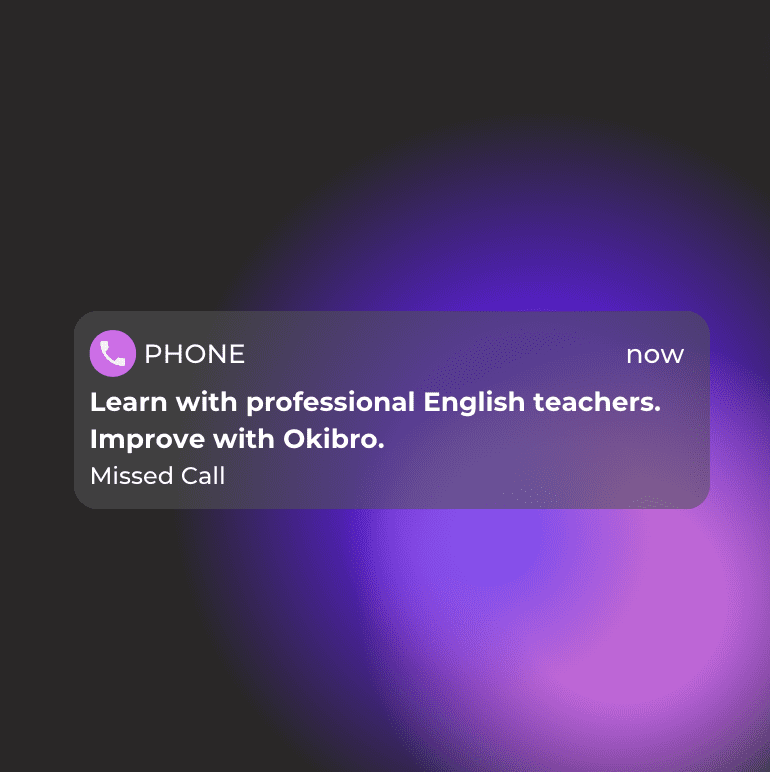“To” vs. “Too” – The Easy Way to Know Which One to Use
English is full of words that sound similar but have different meanings, making it a bit tricky at times.
Today, we’re going to unravel the mystery behind two such words: “To” and “Too.”
They sound exactly the same when you say them out loud – which is why they’re called homophones – but they play very different roles in our sentences.
Stick around as we dive into the world of “To” and “Too,” and soon you’ll be using them like a pro!
Short Answer
“To” is a preposition often used to indicate direction, like in
“I’m going to the store,”
OR a part of the infinitive form of a verb, like in “to run.”
On the other hand, “too” is an adverb that means “also” or “excessively,” as in
“I want ice cream too”
OR
“This soup is too hot.”
Despite sounding the same, they have distinct roles in our sentences.
Definition of “To”
Definition:
“To” is a versatile word in the English language, primarily used as a preposition or as part of an infinitive.
10 Ways to Use “To” in Your Daily Grind (Examples)
Making Plans:
“I need to go to the store after school.”
Expressing Goals:
“My New Year’s resolution is to exercise more.”
Giving Directions:
“To get to my house, turn left at the traffic light.”
Sharing Thoughts:
“I’m looking forward to the weekend.”
During Studies:
“I have to finish my essay by Friday.”
In Conversations:
“I talked to Sam about the football match.”
While Cooking:
“Add salt to taste.”
Making Requests:
“Could you pass the ketchup to me?”
On Social Media:
“I’m about to post a new photo.”
Expressing Gratitude:
“Thanks to everyone for the birthday wishes!”
Definition of “Too”
Definition:
“Too” is an adverb used in English to mean either “also” or “excessively.”
It adds an extra layer of meaning to a sentence, often indicating more than what is necessary or desired.
How to Use “Too” in Ordinary Life
When Agreeing with Friends:
“You love basketball? I love it too!”
Complaining or Pointing Out Issues:
“It’s too noisy in here to concentrate.”
Making Suggestions:
“Maybe it’s too soon to start decorating for Halloween.”
In Casual Conversations:
“I can come to the party too.”
While Shopping:
“This shirt is nice, but it’s too expensive.”
Discussing Plans:
“I think the movie starts too late for us to go.”
During Meals:
“This soup is too spicy for me.”
Giving Feedback:
“Your essay is good, but it’s too long.”
On Social Media Posts:
“I had a great day at the beach too!”
Sharing Experiences:
“I’ve been to New York too. It’s an amazing city!”
Practical Tips for Distinguishing Between “To” and “Too”
Comparative Table: “To” vs “Too”
| Aspect | “To” | “Too” |
| Basic Meaning | Preposition or part of an infinitive verb | Adverb meaning ‘also’ or ‘excessively’ |
| Example Usage | “Going to the beach.” | “I want to go too.” |
| Function | Shows direction, purpose, or infinitive | Indicates addition or excess |
| Sentence Example | “I need to study for my exams.” | “This coffee is too hot to drink.” |
| Context | Direction: “Walk to the car.” | Addition: “Can I come too?” |
| Infinitive: “To learn.” | Excessiveness: “Too much noise.” | |
| Time: “Countdown to midnight.” | Agreement: “I think so too.” | |
| Purpose: “Key to success.” | Negative Aspect: “Too tired to go out.” | |
| Comparison: “Compared to last year.” | ||
| Memory Tip | Associated with action or movement | Think of the extra ‘O’ for ‘over’ or ‘extra’ |
List of Sources to Improve Your Grammar
“Woe is I: The Grammarphobe’s Guide to Better English in Plain English” by Patricia T. O’Conner
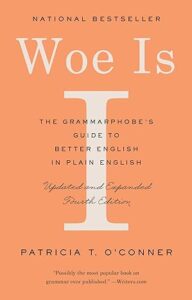
This book offers a lighthearted and accessible approach to grammar and writing. It’s perfect for readers who want to improve their English in a fun and easy-to-understand way.
“Between You & Me: Confessions of a Comma Queen” by Mary Norris.
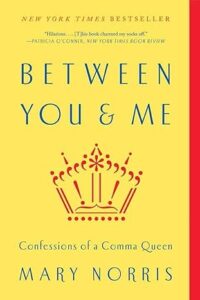
Written by a long-time copy editor for The New Yorker, this book provides insightful, humorous observations about grammar and punctuation in the context of real-world writing.
“The Sense of Style: The Thinking Person’s Guide to Writing in the 21st Century” by Steven Pinker
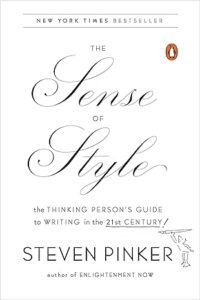
Pinker uses recent cognitive science to explain how writing works, how to craft clear, coherent, and stylish prose, and why writing is an essential part of the human experience.
“My Grammar and I (Or Should That Be ‘Me’?): Old-School Ways to Sharpen Your English” by Caroline Taggart and J. A. Wines
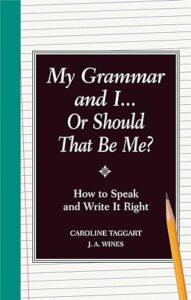
This book is a refresher course in English grammar, covering everything from the basics to more complex issues, all presented in an engaging and straightforward manner.
“Grammar for Dummies” by Geraldine Woods.
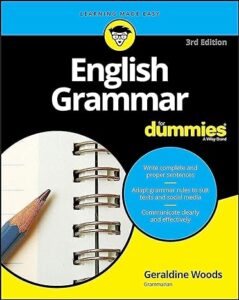
Part of the popular “For Dummies” series, this book breaks down grammar rules into simple, easy-to-follow advice, making it perfect for beginners or anyone who needs a quick refresher.
These books range from light-hearted and humorous to more scientific and cognitive approaches, offering various ways to delve into the intricacies of grammar and language.
They’re great resources for ANYONE looking to enhance their writing and speaking skills.
